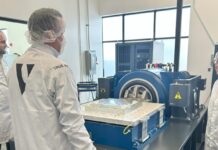Artificial Intelligence: Transforming Economies and Workforce Development
Artificial Intelligence (AI) is revolutionizing industries and reshaping economies around the globe. As this transformative technology continues to evolve, it is crucial to ensure that the workforce is adequately prepared to meet the challenges and opportunities it presents. Louis Stewart, the head of strategic initiatives for NVIDIA’s global developer ecosystem, sheds light on this subject in the latest episode of the AI Podcast.
Stewart emphasizes the profound impact AI is having across various ecosystems. "AI is fueling a lot of change in all ecosystems right now," he notes. It is reshaping our understanding of traditional economic development, influencing how states and countries strategize to remain competitive on a global scale, and driving workforce development initiatives.
AI Education: A Foundation for the Future
The journey toward a future-ready workforce begins with education. Stewart highlights the importance of educating individuals about AI, its capabilities, and the workings of AI-powered tools. He stresses that AI education is necessary at all levels, with a particular focus on higher education institutions. These institutions must anticipate future trends to ensure that graduates are equipped with the skills necessary for the evolving job market.
"Graduates need to understand AI and have some experience with it," Stewart explains. He clarifies that this is not solely an engineering or research issue but a comprehensive workforce challenge. For instance, in Gwinnett County, Georgia, a K-16 curriculum has been developed to introduce young students to AI concepts. Stewart believes that if children are already interacting with AI through their phones, they should be encouraged to delve deeper and envision themselves as future innovators and contributors to technological advancement.
Inclusive AI Education: Leaving No One Behind
A holistic approach to AI education extends beyond the classroom. It involves creating opportunities for the broader community to engage with AI learning. Stewart, drawing from his extensive experience in the public sector, advocates for inclusive education practices. Before joining NVIDIA, he served in various capacities for the state of California and the city of Sacramento. His tenure as Sacramento’s chief innovation officer underscores the significance of inclusive progress.
"Sacramento was aspiring to become an innovation leader at both the state and national levels," Stewart recounts. He recognized that certain areas of the city would miss out on innovation unless it was actively introduced to them. For example, when autonomous vehicles were brought to Sacramento, it was important that not only legislators and the California Highway Patrol benefited, but the general public as well.
Understanding the implications of self-driving vehicles was essential for everyone involved. This included comprehending the technology behind autonomous vehicles and the new skill sets required by mechanics to maintain these advanced systems. Parents also needed to grasp how self-driving cars could enhance their lives, allowing them to transport their children to school without disrupting their work schedules.
Stewart emphasizes that different communities, businesses, and states will adopt varied approaches to AI implementation, reflecting their unique needs and priorities.
Diverse Strategies for AI Implementation
Public-private partnerships play a pivotal role in the widespread adoption of AI, both in the United States and beyond. NVIDIA is actively collaborating with states and educational institutions across the country to advance AI workforce development. The programs being established are as diverse as the states they serve.
"Every state has its idea about what they want to do when it comes to AI," Stewart explains. Despite these differences, common goals unite these efforts. When Stewart’s team engages with state officials about AI’s potential to empower the workforce, create job opportunities, and promote collaboration and inclusivity, they find receptive audiences.
Stewart notes that many states have made significant progress in their AI strategies. "We’ve been pleasantly surprised at how far along some of the states are with their AI strategies," he remarks. In August, NVIDIA announced its collaboration with California to train 100,000 individuals in AI skills over the next three years. This ambitious initiative involves all 116 of California’s community colleges and the state’s university system. NVIDIA is also partnering with the California human resources system to help state employees integrate AI skills into their current and future roles.
In Mississippi, the Mississippi Artificial Intelligence Network (MAIN) represents one of the first statewide initiatives dedicated to addressing AI’s impact on workforce development. MAIN collaborates with educational partners, including community colleges and universities, to facilitate AI education and training across the state.
Embracing Technology for a Prosperous Future
Stewart underscores the importance of actively engaging with AI tools to comprehend their benefits for the workforce landscape. "Now is not the time to stay on the sidelines," he asserts. "This is the time to jump in and start understanding."
Small businesses, for example, can begin by utilizing applications like ChatGPT to witness firsthand how AI can revolutionize their operations. Stewart suggests that businesses could then partner with local school systems to empower student interns to develop AI-powered tools and workflows for tasks such as data analysis and marketing.
This approach creates a mutually beneficial scenario: businesses transform themselves with AI while offering students valuable real-world experience. It is imperative for individuals to stay informed about the changes AI is driving and to actively participate in shaping our collective future.
"Workforce development is, I think, at the crux of this next part of the conversation because the innovation and the research and everything surrounding AI is driving change so rapidly," Stewart concludes. For more insights from NVIDIA’s Louis Stewart on workforce development opportunities, listen to the latest AI Podcast on SoundCloud.
As AI continues to reshape the world, understanding its implications and preparing the workforce to navigate this evolving landscape is essential. By embracing education, fostering inclusivity, and actively engaging with AI, we can ensure that the transformative power of AI benefits all of us.
For more Information, Refer to this article.


































